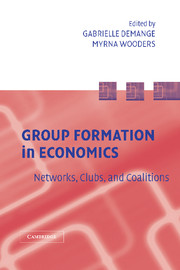Introduction
Published online by Cambridge University Press: 02 February 2010
Summary
Diverse activities are conducted within and by organized groups of individuals, including political, economic, and social activities. These activities have increasingly become subjects of intense game-theoretic research. A sample of the subjects treated are trade networks, coauthorship networks, buyer-seller networks with differentiated products, and networks of information sharing. Other subjects are social norms are punctuality, the adoption of new technologies, clubs and the provision of club goods and public goods, and collusive alliances, among corporations, international alliances, and trading agreements. This volume, which has three main parts, is an introduction to game-theoretic treatments of organized groups, with networks, clubs, and coalitions, including some illustrations and applications.
Part One is an introduction to recent studies on network formation with bilateral relationships as its principal focus. Although this promising approach is not yet fully developed and is still primarily theoretical, the literature is already vast. There is a wide literature in sociology and economics that makes the importance of social networks clear. One topic of this literature, for example, is the crucial role of personal contacts in obtaining information about job opportunities. Networks of relationships also underlie the trade and exchange of goods in noncentralized markets, and the provision of mutual insurance in developing countries. The aim of much recent research on networks in economics and game theory is to give strategic foundations to network formation.
Part Two discusses societies that may be partitioned into multiple groups.
- Type
- Chapter
- Information
- Group Formation in EconomicsNetworks, Clubs, and Coalitions, pp. 1 - 8Publisher: Cambridge University PressPrint publication year: 2005
- 6
- Cited by



